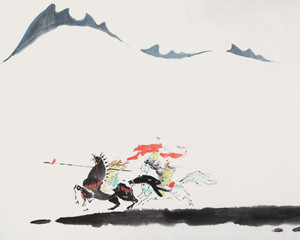王清惠,南宋末年被选入宫为昭仪,才名冠绝宫廷。至元十三年正月(1276),元兵攻入南宋都城临安(今杭州),三月,三宫、后妃、侍臣等均被俘虏北上。王清惠也在被俘之列,经过汴京夷山驿站时,她在驿站墙壁上题下这首《满江红》。以昭仪的高贵之身忽然沦为俘虏,亲历宋亡并被驱逐北上,家破人亡自身前途难料,在突如其来的灾难中,词人将一腔伤痛沉重抒发于这首小词中,所以字字是血泪,句句是辛酸。

王清惠·《满江红》
太液芙蓉,浑不似、旧时颜色。曾记得、春风雨露,玉楼金阙。名播兰馨妃后里,晕潮莲脸君王侧。忽一声、鼙鼓揭天来,繁华歇。
龙虎散,风云灭。千古恨,凭谁说?对山河百二,泪盈襟血。驿馆夜惊尘土梦,宫车晓辗关山月。问姮娥、于我肯从容,同圆缺。
P'u – Man Chiang Hung
(To the tune-title ‘Sunset on the River')
Journey into Captivity
Wang Ch'ing-hui
Mimosa at T'ai-yeh
Cannot have the same
Colour as in those days of old
Remembered from a past
Of spring-time dew and wind and rain
In the Jade Tower and Palace of Gold.
My name among the royal ladies spread like orchid-scent;
A blushing, bashful lotus-flower the Sovereign's grace befriended.
When suddenly a clamour
Of war-drums fit to startle heaven burst.
The gay life ended.
Dragon and Tiger fled,
Cloud and Wind were gone.
To share such depth of sorrow
Whom could I count upon?
Faced with the sight of all those rivers and mountains
Blood stained my dress, and tears fell so.
Each night at road-side inns I woke in terror from dreams of travel;
Each dawn the palace carriages rolled through passes lit by the moon.
I begged Ch'ang-O
In kindness to allow me to go with her
Wherever she might go.
(Alan Ayling and Duncan Mackintosh 译)
更多精品翻译素材,敬请关注可可英语。












